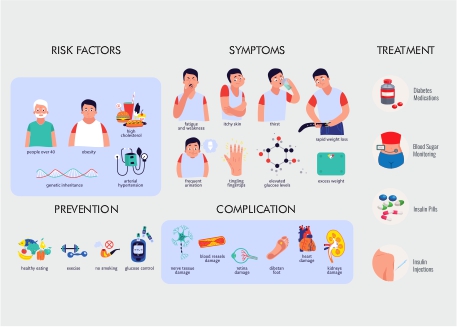Diabetes Symptoms Prevention And Treatment: A Comprehensive Guide
Diabetes is a condition that occurs when your blood sugar (glucose) is too high. It develops when your pancreas doesn't produce enough insulin or when your body becomes resistant to insulin. If left untreated, diabetes can lead to serious health complications. However, with proper prevention and treatment, you can manage diabetes effectively.
Click on the section you want to read from the post table of contents :

Credit: sterlingaccuris.com

Credit: www.everydayhealth.com
-----------------------------------------------------------------------------------------------------------------------------
▶▶ Read more : Low-Carb Diet Weight Loss in 2 Weeks: Get Fast Results!
▶▶ Read more : Workout Routine to Build Muscle And Lose Fat
▶▶ Read more : Top 10 Workout Plans for Men to Build Muscle in 2024
-----------------------------------------------------------------------------------------------------------------------------
Diabetes Symptoms
Recognizing the symptoms of diabetes is crucial for early diagnosis and treatment. Some common symptoms of diabetes include:
- Toilet-going for a wee a lot, especially at night
- Feeling excessively thirsty
- Feeling more tired than usual
- Losing weight without trying
- Experiencing genital itching or thrush
- Cuts and wounds taking longer to heal
- Experiencing blurred eyesight
- Increased hunger
Prevention of Diabetes
While there is no known cure for diabetes, there are steps you can take to prevent its onset. Here are some preventive measures:
- Maintain a healthy weight: Obesity is a significant risk factor for diabetes. By maintaining a healthy weight through a balanced diet and regular exercise, you can significantly reduce your risk.
- Eat a balanced diet: Focus on whole, unprocessed foods and limit your consumption of sugary and high-carbohydrate foods. A healthy diet can help regulate blood sugar levels and prevent diabetes.
- Be physically active: Engage in regular physical activity such as walking, jogging, or cycling. Exercise helps lower blood sugar levels and improves insulin sensitivity.
- Avoid tobacco and limit alcohol consumption: Smoking and excessive alcohol consumption increase the risk of diabetes. Quitting smoking and moderating alcohol intake can help prevent diabetes.
- Manage stress levels: Chronic stress can contribute to the development of diabetes. Incorporate stress-reducing practices into your daily routine, such as meditation, yoga, or hobbies.
Treatment for Diabetes
Managing diabetes requires a combination of lifestyle changes and medical interventions. Here are some common treatments for diabetes:
- Diet and nutrition counseling: Working with a registered dietitian can help you create a personalized meal plan that focuses on managing blood sugar levels.
- Exercise and physical activity: Regular exercise helps lower blood sugar levels, improves insulin sensitivity, and promotes overall health.
- Medications: Depending on the type of diabetes you have, your doctor may prescribe oral medications, insulin therapy, or other injectable medications to manage your blood sugar levels.
- Regular monitoring: Monitoring your blood sugar levels at home using a glucometer allows you to track your progress and make necessary adjustments to your treatment plan.
- Education and support: Joining diabetes support groups or attending diabetes education classes can provide valuable information and emotional support to help you effectively manage your condition.
Remember, it is important to consult with your healthcare provider for a proper diagnosis and personalized treatment plan for diabetes.
Frequently Asked Questions Of Diabetes Symptoms Prevention And Treatment: A Comprehensive Guide
1.What Are The Prevention And Treatment For Diabetes?
Ans: Prevention and treatment for diabetes include maintaining a healthy diet, engaging in regular physical activity, taking prescribed medication, and getting regular screenings. By following these steps, diabetes can be managed and its complications can be avoided.
2.How Do I Know If I Am Diabetic?
Ans: If you experience frequent urination, excessive thirst, fatigue, unintentional weight loss, genital itching, slow-healing wounds, blurry vision, or increased hunger, you may have diabetes. Seek medical advice for a proper diagnosis.
-----------------------------------------------------------------------------------------------------------------------------
▶▶ Read more : Control Early Diabetes: Simple Steps for Success
▶▶ Read more : Skin care routine for dry skin at home in 2024
-----------------------------------------------------------------------------------------------------------------------------
3.What Drink Lowers Blood Sugar?
Ans: Water, unsweetened teas, and black coffee can help lower blood sugar indirectly by promoting a feeling of fullness and providing antioxidants that reduce inflammation.
4.How Does Type 2 Diabetes Make You Feel?
Ans: Type 2 diabetes can make you feel thirsty, tired, and need to urinate frequently. You may also experience weight loss, genital itching or thrush, slow healing cuts, blurred vision, and increased hunger.
Conclusion
Dear Reader If you have read our today's post completely carefully then you must have understood what you should do if you have diabetes or how to prevent diabetes and what is its treatment. Dear readers if you like reading today's post then share it with your friends and visit futuredreamit.com regularly to get more informative information like this. Thanks everyone








ফিউচার ড্রীম আইটির নীতিমালা মেনে কমেন্ট করুন। প্রতিটি কমেন্ট রিভিউ করা হয়।
comment url